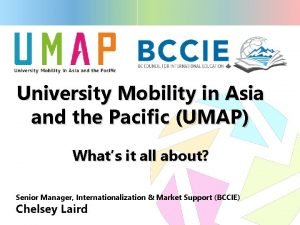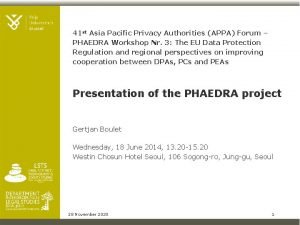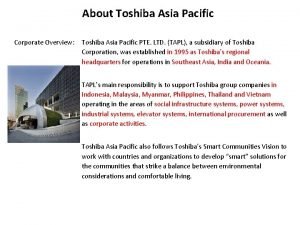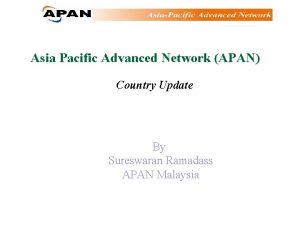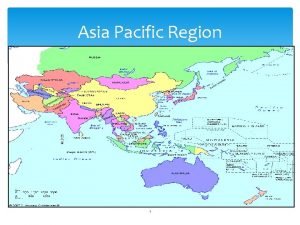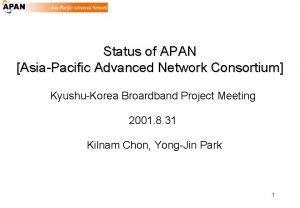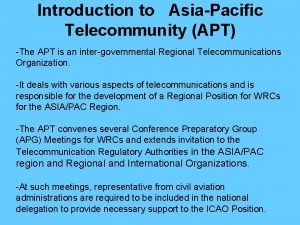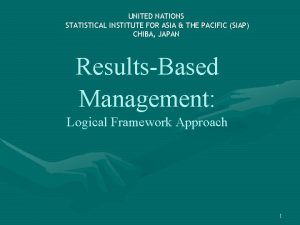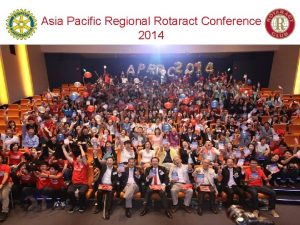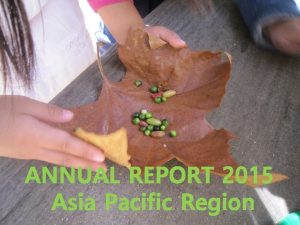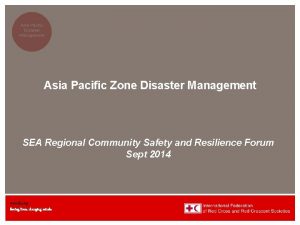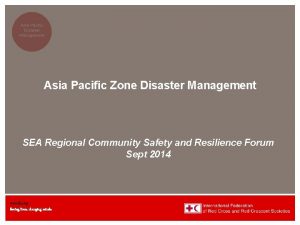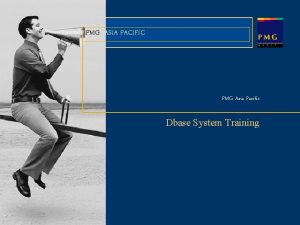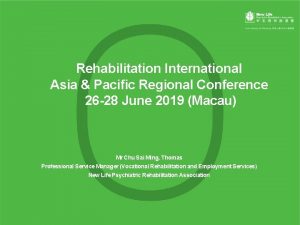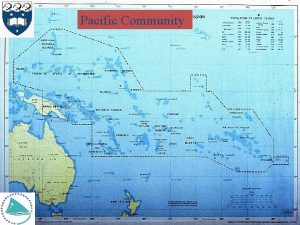19 th Asia Pacific Regional Conference of ADI
















- Slides: 16

19 th Asia Pacific Regional Conference of ADI October 2016 Glenn Rees AM Chair, ADI

A tipping point We have opportunities to make progress on the international stage in the World Health Assembly, human rights and dementia friendly communities. The time to act is now • Many achievements but 60 per cent of people with dementia with next to no services in LMIC • Only now starting to focus on human rights • Stigma still a problem worldwide

The opportunities First the draft resolution for the World health Assembly in May 2017 Second, monitoring the human rights of people with dementia within the framework of the Convention on the Rights of Person’s with Disabilities and implementing dementia friendly communities. www. worldalzreport 2015. org

The draft resolution • GLOBAL TARGET 1: 75% of countries will have developed or updated national strategies, policies, plans, or frameworks for dementia, either stand-alone or integrated into other policies/plans, by 2025 • GLOBAL TARGET 2: 75% of countries will have at least one functioning public awareness campaign on dementia and/or dementia-friendly initiatives to foster a dementia inclusive society by 2025 • GLOBAL TARGET 3: The global targets defined in the Global Action Plan for Prevention and Control of Noncommunicable Diseases are achieved for risk reduction by 2025

The draft resolution • GLOBAL TARGET 4: In at least half of countries, as a minimum, 50% of people with dementia are diagnosed and receive health and social care services • GLOBAL TARGET 5: 75% of countries provide national support and training programmes for carers and families of people with dementia by 2025 • GLOBAL TARGET 6: 50% of countries routinely collect a core set of dementia indicators through their national health and social information systems on which they report every two years by 2025 • GLOBAL TARGET 7: At least 50% of countries are allocating 1% of their dementia expenditure to dementia research

Building on the resolution ADI and Members need to plan now and ask some hard questions • Should we seek discussions with our government to get their support for the resolution? This might be most useful where a country is on the Executive Board of the WHO, like New Zealand • How can we take advantage of the resolution in terms of our priorities? • What evidence or support is needed to support those priorities in our country? • What can be achieved by systemic change and better coordination within the health care system?

Building on the resolution • What role is your organisation positioned to play in working with government? For example, in respect of helplines, training, support for family carers and awareness? • What role can people with dementia and family carers play in supporting your advocacy? • Is there scope for a national alliance or partnerships to support advocacy by your organisation? • How can ADI help to support your advocacy? For example, should we better resource regional approaches to advocacy on the model of APRO and now Latin America/Central America and the Caribbean?

Building on the resolution • ADI will consult members on the support they need in their advocacy • In particular ADI will need to support Members who are on the Executive of the WHO in shaping the resolution in the months before May 2017 • ADI is considering the development of national policy indicators to monitor progress in implementing dementia plans • Up dating ADI publications like DFCs and producing new publications • Need to be innovative in linking policies – awareness to DFCs and dementia risk reduction • Establish a priority for carer support

World Alzheimer Report 2016 Improving Healthcare for people living with dementia • Analysis of coverage, quality and costs for dementia care models in Canada, (Mainland) China, Indonesia, Mexico, South Africa and Switzerland • Need for a coordinated, integrated and holistic approach to dementia care from diagnosis to end of life. Other diseases have a clear healthcare ‘pathway’. This must be made more explicit for dementia. • Lack of research on current dementia care outcomes and cost effectiveness • Shifting of tasks from specialist to primary care could save up to 40% but would require significant training and integrated case management • Increasing diagnosis and coverage of dementia healthcare services is affordable - but requires political will.

Being inclusive People with disabilities have fought over many decades to have full participation in society on an equal basis with others. The Convention on the Rights of Persons with Disabilities (CRPD) includes dementia. It provides for example for: • Decision making that respects their capacity • Living in the community as independently as possible • Access to health services without discrimination • Opportunities for recreational and other activities Alzheimer’s organisations should partner with disabilities organisations to monitor CRPD

Why are DFCs important? DFCS HAVE THE POWER TO CHANGE THE WAY PEOPLE THINK ABOUT DEMENTIA Two different but complementary objectives 1: To reduce stigma and promote awareness – the lived experience 2: To empower people living with dementia to take decisions about their lives – the rights approach

Four expressions of dementia friendliness • Human rights: being inclusive and supporting and protecting the rights of a person with dementia • Awareness: tackling stigma and lack of community understanding of dementia • Health and services: increasing the capability of the health and care workforce • Improving the physical environment: residential care, public spaces - the Ageing Cities movement

Two new Dementia Friendly Communities publications launched in 2016 www. alz. co. uk/DFC

Conclusion During and after this Conference I hope you will take the opportunity to reflect on • How ADI can help you in your advocacy • How you can build on the resolution in your advocacy and policy work • How you can work with disabilities organisations in your country to monitor the rights of people with dementia

Follow ADI on Twitter @Alz. Dis. Int @glenn_rees Like us on Facebook /alzheimersdiseaseinternational Visit our website www. alz. co. uk

 Regional cadet support unit pacific
Regional cadet support unit pacific Ritsumeikan asia pacific university notable alumni
Ritsumeikan asia pacific university notable alumni Schaeffler korea
Schaeffler korea Asia-pacific academy of ophthalmology
Asia-pacific academy of ophthalmology University mobility in asia and the pacific
University mobility in asia and the pacific Enaca
Enaca Asia pacific privacy authorities
Asia pacific privacy authorities Asia pacific bmi
Asia pacific bmi Toshiba asia
Toshiba asia Asia pacific advanced network
Asia pacific advanced network Ituc asia pacific
Ituc asia pacific Asia pacific seed association
Asia pacific seed association Asia pacific region
Asia pacific region Asia pacific advanced network
Asia pacific advanced network Asia pacific telecommunity
Asia pacific telecommunity Statistical institute for asia and the pacific
Statistical institute for asia and the pacific Imperialism in southeast asia and the pacific
Imperialism in southeast asia and the pacific




